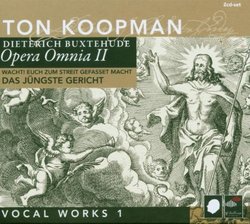Buxtehude's Complete Vocal Works--A Superb Start
Paul Van de Water | Virginia, USA | 06/06/2007
(5 out of 5 stars)
"Ton Koopman, the Dutch early music specialist, has previously recorded several excellent discs of Buxtehude's cantatas on Erato/Warner. Now he is embarking on the first-ever set of all of Buxtehude's works ("Opera Omnia" in Latin) on the Challenge label. This recording of the oratorio "The Last Judgment" is the second volume in the series and the first volume of vocal works. As would be expected, it's a superb start to the project.
Interestingly, Koopman has chosen to commence his series with a work that may not have been written by Buxtehude. This piece is included among other doubtful works in the appendix to the catalog of Buxtehude's works (BuxWV Anh. 3). Nonetheless, Kerala Snyder--the leading Buxtehude scholar--believes that it was the work that Buxtehude presented at his famous Abendmusiken (evening concerts) in Lubeck in 1682. Koopman says that he sees "no room for doubt" of the work's authenticity.
One reason for questioning Buxtehude's authorship of the piece is the abundance of simple, strophic arias. The recent discovery of Bach's 12-strophe aria "Alles mit Gott" demonstrates, however, that even the great Johann Sebastian made use of this form, which was more accessible to listeners than elaborate contrapuntal works. And, of course, it was the young Bach who made the famous 250-mile pilgrimage on foot from Arnstadt to Lubeck to meet Buxtehude and hear his Abendmusik of 1705.
If you already know and love Buxtehude, Koopman and his Amsterdam Baroque Orchestra hardly need a recommendation. This recording represents an important addition to the Buxtehude discography, and it could not be bettered in any significant respect.
If you're not familiar with Buxtehude, I urge you to get acquainted, although I would probably start with some pieces that are clearly authentic and more immediately appealing. One such possibility is Emma Kirkby's recording of solo vocal music, recently re-released on Naxos. Another is the reconstruction of an Abendmusik--a program of varied works for organ, voices, and instruments--by the Goteborg Baroque Arts Ensemble on Intim Musik.
Paul N. Van de Water"
A voice teacher and early music fan
George Peabody | Planet Earth | 05/01/2007
(5 out of 5 stars)
"BUXTEHUDE'S OPERATIC TENDENCIES! (NO KIDDING!)
Dietrich Buxtehude (1637-1707)was one of the most prolific composers of his time, his scope including liturgical music, cantatas and oratorical works for services and concerts,solo arias and organ preludes, fugues, toccatas, chorale variations and fantasias, and chamber music including nineteen keyboard suites.
This oratorio represents a major, heretofore unknown vocal work by this great North German composer that all baroque fans may enjoy. Although its origin is sketchy, it may well have been written for the 'Evening Music' series of public concerts that Buxtehude organized and promoted at his church in Lubeck. It survived only a set of incomplete parts, but thanks to extensive scholarly work and research by Koopman, we now have his very impressive reconstruction of it premiered on these discs. This is like no other Buxtehude you've ever heard before, because it's very lyrical with passages that are quite operatic.
Though it is arguable that Buxtehude was Bach's greatest precursor, it would be foolish to think of his vast output merely as a preparation for Bach. Buxtehude's music deserves to stand at the summit of his age in its own right.
Tom Koopman's new edition of "Das jungste Gericht" (The Last Judgement) is strictly faithful to the sources and preserves the three-part division of the Oratorio.
In Act 1 of "Wacht! Euch zum Streit gefasset macht" the singing roles are assigned to the allegorical figures Greed,Heedlessness and Pride(three sopranos) and to the Voice of God (bass); in Acts II and III the solo voices are not assigned to any specific roles and show signs of inconsistency in this regard. The choir,which sings frequently, is 5-voice throughout. The instruments are limited to strings and continuo.
This is definitely operatic in nature with some very dramatic moments.
The performance is up-beat and never dull, and very well executed, as one might expect from Koopman. IN fact it's all outstanding vocally and instrumentally. The 3 sopranos had clear, clean voices with a truly lovely tone quality. The tenor and bass sang skillfully and very dramatically in many of their renditions. Robin Blaze, countertenor, handled his part with expertise, good diction and a 'pretty' sound. I would have liked to hear a little more drama from him, but that's not his style. This is the kind of music that Andreas Scholl does well because of his knowledge of German; he gets all the nuances as only a 'native' can do. Just my opinion.
I have enjoyed this recording several times over, and I never tire of hearing it."


 Track Listings (45) - Disc #1
Track Listings (45) - Disc #1